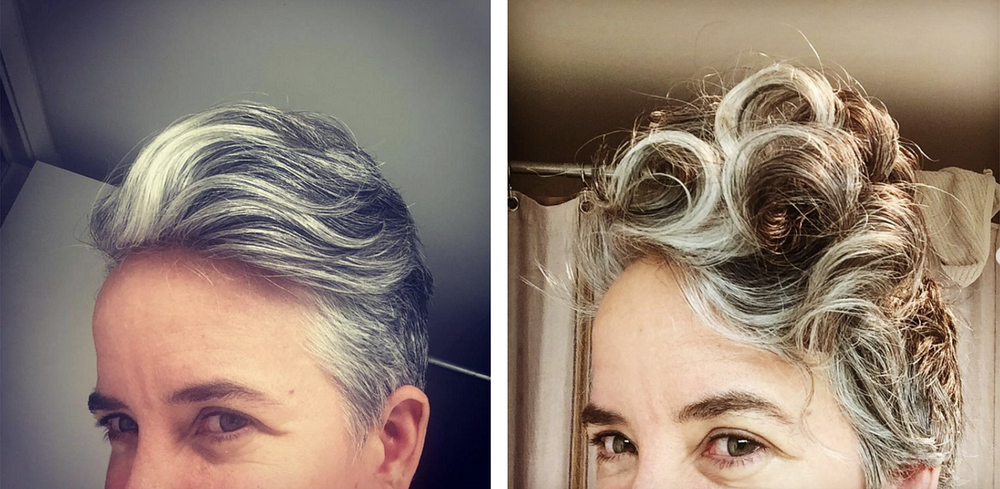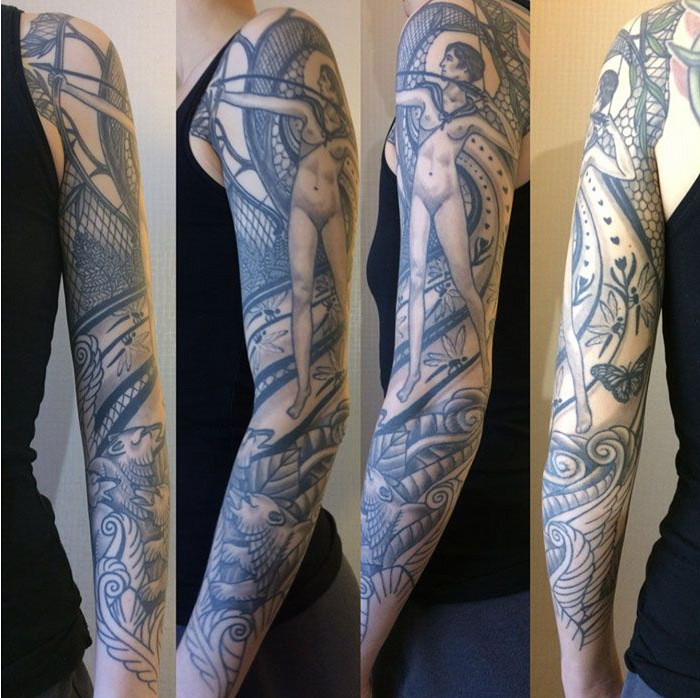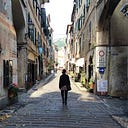Sam McWilliams is an Intrepid Cliff Jumper
VOICES Series
Sam is an artist from San Francisco, CA who lives in Vancouver, BC, Canada with her wife Paige. She has been a tattoo artist for 18 years, and during the COVID-19 lockdown, she became a botanical drawing teacher, as well.

Prologue: I believe the stories we tell one another have the power to change the world. Especially the stories we tell one another about ourselves.
As a society, we focus so much of our attention on the bold-faced “success stories” of CEOs and best-selling authors, the famous and infamous. We get accustomed to glossy, polished anecdotes that are fun to read but hard to relate to. Too often — especially during these times of isolation and separation — we miss the remarkable stories that live all around us.
The neighbor across the street.
The woman behind the cash register.
The co-worker we see every day.
Captivating, inspiring, powerful stories live inside each of us. This series celebrates those stories with more than a dozen interviews of women whose voices you likely haven’t heard before. (Since March is Women’s History Month, it seems like the perfect time for it.) I asked each of these women to share some of their personal story, and talk about how they have found — or are still finding — their own voice.
Today, we hear from Sam.

In her own words:
I first realized I was a feminist when I was a very young girl playing soccer, and adults kept telling me I should be less competitive and not play so hard and not try to win.
As a child I felt awesome and empowered and bright and brilliant and in love with myself, and external forces tried to diminish that love around the time I was seven. That’s when people started trying to crush that bright little light.
That’s when the parents at soccer told me girls are not supposed to be so competitive. And I was like, “Why are we playing this game then? Why are you never saying that my brother or the boys should be less competitive?” I was just playing to the best of my ability.
Then some of those women, the other parents, took me into the bathroom and pulled my pants down to check my gender.
I had long hair. I had hair down to my waist, and I dressed like a girl. But I guess they thought I was too good at soccer, so I must actually be a boy.

I grew up in Orinda, California. It’s an affluent suburb near San Francisco and Berkeley. The town is majority white, and the culture is all about keeping up with the Joneses. Like, if Lady A gets a Mercedes, then Lady B has to get the Mercedes. Everyone was very obsessed with how things looked. There was a lot of alcoholism, as well.
My school was mostly white kids with a small percentage of Asian kids and a smaller percentage Latino kids and an even smaller percentage of Black kids. I would say Orinda was a racist town where we were really taught the values of white supremacy.
My mother was a strong creative person, an independent thinker. My father was a very tender, delicate, spiritual, creative, and charming man. He was a sweet person.
But the two factors that go along with my parents is that my mother was affected by the family disease of alcoholism. And that disease of alcoholism was one of the biggest factors that shaped my personality, because I grew up in a caretaker role in that family.
And then the second factor was that my father was affected by homophobia. My dad was a gay man who tried to do what he thought was supposed to do and get married to a woman and have kids. He finally got the courage to come out when I was a preteen.
So those two factors very scary for me, growing up.

But the good thing about Orinda was that there was a lot of nature. I got to grow up in a California ranch style home on an acre of property, and I would spend a lot of time by myself in nature. That was a great influence on me, as well.
At that time there were still a lot of wild animals — deer and bobcat and mountain lions and quail and just all sorts of flora and fauna that I got to safely interact with and watch. And lots of freedom, since I was a child of the 70s. It was like, head out on your BMX bike by yourself and come back at some point. Fall out of a tree? That’s ok, you just walk home later. I always just felt at home in nature.

What was valued about being a woman in your culture?
I was definitely taught the lessons of the patriarchy, that the father figure or the man should be in charge and the women and the children should be subservient to him.
What I saw was really that your value as a woman or even as a girl was based on how you looked.
And I was too big, too strong, too loud, too aggressive, too independent. I had too much of a presence and took up too much space.
So I got all the messages that I should fit into the norms more, be like the other girls.
I remember one time in the swimming pool, my brother (who is a year and a half older) said, “You should start shaving your legs and your armpits.”
And I was like, “Why?! I don’t want to do that!”
He said, “If you do it, the boys will like you.”
I said, “I don’t care whether boys like me or not!”
He also said: “You should let the boys win in races and sprints and sporting events, otherwise you’ll never have a boyfriend.”
This was before I even had any notion of any sort of romantic relationships, and I was like, “Well, why would you want one of those, if you have to lie or trade off who you are? What’s the point?”
I also remember in sixth grade, or maybe seventh, all my girlfriends started to act differently and act dumb — dumber than they actually were. I was like, “Why are they doing that?” It was depressing.
What voices get under your skin?
I think most of mine are patriarchy based, like the voices of what the patriarchy says you’re supposed to do and how you’re supposed to behave. There’s definitely a theme of, “You’re not good enough to do this.”



What gets you out of bed in the morning on the worst of days?
Over the years I’ve developed some morning prayers that I just say privately in my head. I wake up and I basically just start saying, “Thank you.”
Starting with gratitude really helps me, especially during this pandemic. It’s very easy for me to just be grateful to be alive, these days. That’s all I need. And even if I feel awful, like all of us do during this time, if it’s one of those days where I’m like, “God, I’ve just had it already!” I’m still very grateful to be alive.
I have come to realize that it is just really a gift that we get to do this. We don’t know how long we get to be here in this crazy gorgeous world, which is full of wonderful people and terrible things and gorgeous nature.

You create so many things that bring you a lot of joy. How has the pandemic and lockdown changed or refocused your creativity?
Here in Canada, we were shut down for tattooing for a few months, and at first it was a real kind of crisis of identity, like, “What am I doing if I’m not tattooing?”
I’m used to being really oriented to customer satisfaction. Tattooing, for me, is a collaboration where a client brings me an idea, and I respond to it. We go back and forth and we end up making something awesome.

But it was actually a gift to take a break and not have to do anything for anybody else for a minute. I realized that I can come back to my own practice and ask myself, “What do I want to do? What do I want to create? What do I want to offer?”
It’s also just humorous how much easier it is to draw on paper than it is to draw on skin. The paper doesn’t have any needs. It’s not in pain. I can turn it, I can erase it.
It was interesting, also, to see where my self worth was tied up. I mean, this is a revelation I’ve had many times throughout my life, but it was good to get that reminder that my self worth isn’t tied to what I do. I have worth just being alive. I don’t have to do anything to be worthy of anything and I don’t owe anyone anything.

What aspect of your identity is most precious to you?
I don’t have a specific container for it. But I am a spiritual being first. So it’s important for me to stay in touch with that before anything else. For me, spirituality is really linked with the world of plants and nature.

Wendy Hollender, who is a renowned botanical artist and founder of Draw Botanical, invited me to join her team and teach people how to make botanical drawings. Wendy always thanks the plants for guiding her, and she’s not a woo person at all. She kind of sounds like a tough New Yorker lady, but she’ll thank the plants for guiding her, and I like that.
My real solace as a child was to just go sit in nature. I felt comfortable. I felt protected. I felt belonging. I felt all those things that we want as humans, to feel safe and belong and feel connected to something greater than ourselves. I really see that coming back around to get me during this COVID time, like I’m going to come back home to the plant world and take refuge there again.

Is there a time you can remember where you just felt like you were completely silenced or disregarded?
I definitely had that experience in the disease of alcoholism. I think that’s one of the teachings of that disease — that you aren’t supposed to talk about it. You’re not supposed to name it. You’re not supposed to say it out loud.
So that was my early experience from all my family members, both immediate family and extended family. The direct quote was, “Don’t say anything.” And if you do say anything, you’re the one who is causing a problem.
It was a very clear repeated message that was very damaging because it also came along with: “Don’t ask for help. Don’t tell anyone the truth and don’t ask anyone for help.” Not a good lesson plan.
How did you overcome that silencing?
I’m grateful to be a member of a program of support for friends and families of alcoholics. It definitely saves my life.
How do you support other people’s voices?
I volunteer a lot of time listening to other people and just letting them talk it out in a safe space, going through their stages of having to be really messy and terrible and just get it all out in the beginning, and then working the steps of the program. I feel like that’s my main service in life, and it’s one that I’m clearly qualified to do.
As a tattoo artist, you listen to people a lot, too.
I do, and I enjoy it.
How do you best express yourself?
Definitely not verbally! (she laughs) I think that it goes back to my relationship with my father, where we would just spend quiet time either gardening or walking in nature or I would hold on to his pinky and we would walk together.

My favorite way to spend time with people is just being in a beautiful space and experiencing it quietly together.
My favorite relationships in my life have been my surf buddies. We can be so awkward and not deal well with each other on land, but when we’re getting ready to go surfing and then we’re out in the water, we’re just so happy.
I do better talking with people if I’m drawing. I’m terrible sitting at a coffee shop and just looking at each other and talking and listening. I’m like, “This is the worst thing ever.”
But if we’re doing an activity together, I like that much better.
Is any of your art a way to communicate or express yourself?
Right now my art is a practice of communing with plants, having conversations with plants, and offering reverence to the natural world. Also building community with other artists doing similar practices. I am listening, observing, paying attention, and giving constant thanks.
Read more VOICES…
Jamae Tasker is a Warrior of Love
Shayna Hodkin is a Spellbinding Poet
Hattie Anderson is a Confident Black Goddess
Elizabeth Schroeder is a Swashbuckling Peacemaker
Nikka Diaz is a Natural-Born Empath
Kelly Galeano Arce is a Dauntless Truth Seeker
Emma Rekha Marty is a Guardian of Hope
Natalie Patrice Tucker is a Mother of Dragons
Ruth T. is a Queen of Hearts
Tetyana Borshch is a Radical Daydreamer
Brittani West is a World Class Risk Taker
Tiffani Jones Brown is a Lionhearted Listener
Kathy Azada is a Bright Side Enthusiast
Headline History
The titles for the VOICES Series come from Exercise #2 in the Permission to Speak Workbook. The exercise, “You have more power than you know,” encourages participants to choose a title from a list that is offered, or — if none of those titles feels right — to make up one of their own.
“Each of us is our own harshest critic, most of the time,” the workbook says. “We don’t always see ourselves as we are. We instinctively try to hide many things about ourselves — our failures, our mistakes, our weaknesses, our obsessions. …But the things that make you you also give you power.”
Each woman interviewed for the VOICES Series either chose a title for herself from this list, or gave herself a title of her own making.








